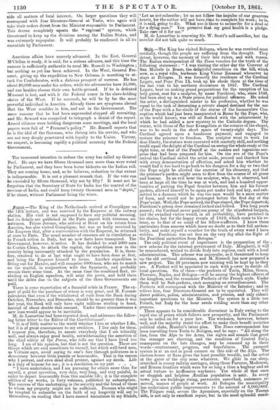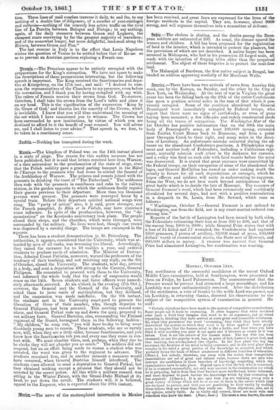The King has visited Bologna, where he was received most
cordially, though the people are suffering from the drought. They detest, however, the memory of their late rulers, and with reason.
The Italian correspondent of the Times vouches for the truth of the following statement : " I was visiting the other day the Convent of San Michele in Bosco, the delightful ccenobium on the hill, which now, as a royal villa, harbours King Victor Emanuel whenever he stays at Bologna. It was formerly the residence of the Cardinal Legate, and Pope Pius IX. took up his abode there at the time of his last visit to his northern dominions in 1857. The Cardinal Legate, bent on making grand preparations for the reception of his holy guest, sent for a sculptor, by name Pacchioni, who, since 1848, had been shut up in a State prison for political offences. He asked the artist, a distinguished master in his profession, whether he was equal to the task of decorating a private chapel destined for the use of the Pope with a fac-simile of the statue of the Immaculate Con- ception which had just been inaugurated in Rome by the Pope, who, as the world knows, was still all flushed with the achievement by which he had added a new mystery to the Catholic dogma. The statue, with those of the four Evangelists at the corners of the chapel, was to be made in the short space of twenty-eight days. The Cardinal agreed upon a handsome payment, and engaged to restore the prisoner to freedom. The sculptor went to work for dear liberty, the statues were executed with masterly skill, and nothing could equal the delight of the Cardinal on seeing the whole ready at the right time, or that of the Pontiff at the sudden and ingenious sur- prise that had been prepared for him. On the eve of the Pope's arrival the Cardinal called the artist aside,praised and thanked him with every demonstration of affection, and asked hint whether he would find it too hard to go back to his dungeon for a day or two that the Pope might be allowed the exercise of his clemency, and that the prisoner's pardon might seem to flow from the source of all grace and honour. In an evil hour the sculptor, who, be it observed, had been at large all the time he was at work, and had a hundred oppor- tunities of putting the Papal frontier between hint and his former gaolers, allowed himself to be again put under lock and key, and sub- mitted to a durance which he was too sure would be a mere matter of form, and would not be prolonged before the first day of the Pope's visit. Well, the Pope arnved, the Pope stayed, the Pope departed; Pacchioni's prison door remained locked and bolted. Two long years passed; the Cardinal never paid one penny of the stipulated bargain, and the swindled victim would, in all probability, have perished in his chains, but for the happy events of 1859, which came to his re- lease, as to that of so many of his fellow-sufferers. I know these particulars from sources which leave no doubt as to their full authen- ticity, and make myself a voucher for the truth of every word I have written. Pacchioni was set free on the very day after the flight of the Pontifical authorities from Bologna."
The only political event of importance is the preparation of the . new scheme for the internal government of Italy. btinghetti, it will be remembered, wished to divide Italy into regions, each with a local administration. This scheme was unpopular, as it threatened to keep up the old sectional divisions, and M. Ricasoli has now prepared a new project. The 59 provinces now existing will be kept up as they are. A Prefect will be appointed to each with p ower to decide all local questions. Six of these—the prefects of Turin, Milan, Genoa, Florence, Naples, and Bologna—will be among the highest officers of the kingdom, and the remainder Prefects of the French style. Under them will be Sub-prefects, each managing an arrondissement. The Prefects will correspond with the Minister of the Interior; and to relieve him, four Directors-General are to be appointed. They will direct polities, police, administration, and prisons, and only submit important questions to the Minister. The system is a little too French, but Italy for the hour needs welding more than any other process.
There appears to be considerable discontent in Italy owing to the rapid rise of prices which follows new prosperity, and the Parliament may be called on for a poor law. The workmen, however, behave well, and the majority resist the effort to make their benefit societies political clubs, Mazzmi's latest plan. The limes correspondent has been travelling from Turin to Bologna, and he says : "All along the line, from the Alps to the Arno, the sights and sounds that greet the stranger are cheering, and the condition of Central Italy, consequent on the late changes, may be summed up in three words—contentment, progress, and hopefulness. The passport system is at an end in good earnest on this side of the Alps. The custom-house at Suss gives the least possible trouble, and the octroi at the gates of the city none whatever. We glide ht our sleep, stretched in roomy railway, carriages, along those 'Parmese, Modenese, and Roman frontiers which were for so long a time a bugbear and an actual torture to inoffensive wayfarers. The whole of that once so sluggish and helpless Amilian population is astir. In every town you see buildings rising, pavements smoothed, nuisances re- moved, masses of people at work. At Bologna the municipality has undertaken public improvements to the amount of 6,000, The Filigare road, across the Apennines, especially on the Tuscan side, is not only in excellent repair, but in the most splendid condi-
lion. Three lines of mail coaches traverse it daily, to and fro, to say nothiug of a double line of diligences, of a number of post-carriages and veiturise—nothing of the scarcely less active traffic on the rival line of La Poretta between Bologna and Pistoja ; to say nothing, again, of the daily steamers between Genoa and Leghorn, the cheapest route conveying by far the greatest majority of travellers; and of the somewhat longer, but more delightful, land-mail along the Riviera, between Genoa and Pisa."
The last rumour in Italy is to the effect that Louis Napoleon wishes the question of Venice to be settled before that of Ito me so as to prevent an Austrian garrison replacing a French one.































 Previous page
Previous page